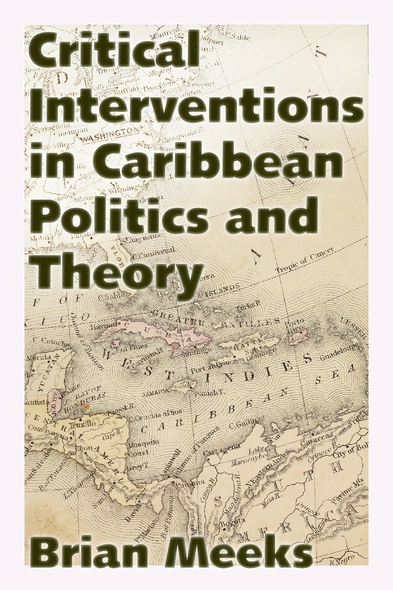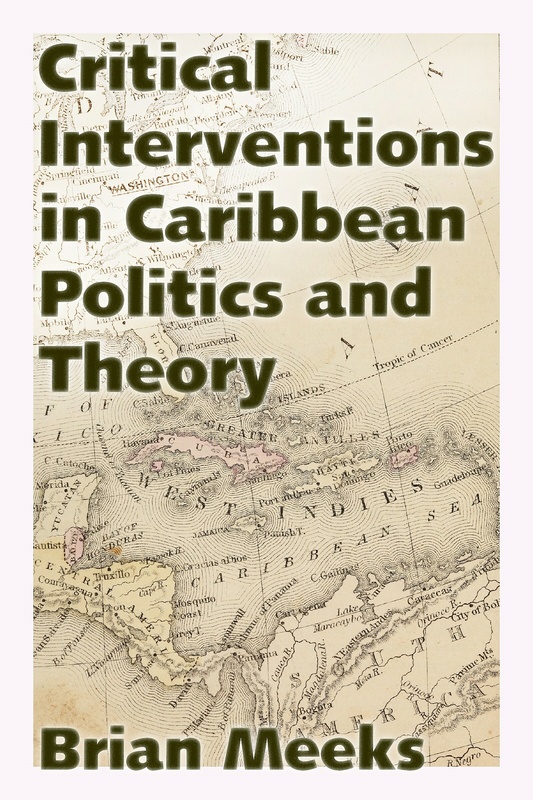Our shopping cart is currently down. To place an order, please contact our distributor, UTP Distribution, directly at utpbooks@utpress.utoronto.ca.

Critical Interventions in Caribbean Politics and Theory
These essays by Brian Meeks, a noted public intellectual in the Caribbean, reflect on Caribbean politics, particularly radical politics and ideologies in the postcolonial era. But his essays also explain the peculiarities of the contemporary neo-liberal period while searching for pathways beyond the current plight.
In the first chapters, titled “Theoretical Forays,” Meeks makes a conscious attempt to engage with contemporary Caribbean political thought at a moment of flux and search for a relevant theoretical language and style to both explicate the Caribbean’s recent past and confront the difficult conditions of the early twenty-first century. The next part, “Caribbean Questions,” both retrospective and biographical, retraces the author’s own engagement with the University of the West Indies (UWI), the short-lived but influential Caribbean Black Power movement, the work of seminal Trinidadian thinker and activist Lloyd Best, Cuba’s relationship with Jamaica, and the crisis and collapse of the Grenadian Revolution.
As evident in its title, “Jamaican Journeys,” the concluding section excerpts and extracts from a longer, more sustained engagement with Jamaican politics and society. Much of Meeks’ argument builds around the notion that Jamaica faces a crucial moment, as the author seeks to chart and explain its convoluted political path and dismal economic performance over the past three decades. Meeks remains surprisingly optimistic as he suggests that despite the emptying of sovereignty in the increasingly globalized world, windows to enhanced human development might open through policies of greater democracy and popular inclusion.
The book represents a major contribution to Caribbean political thought and will be useful for those interested in understanding critical aspects of the recent state of play in the philosophical currents of the region.
In this reassemblage of previous publications, Brian Meeks brilliantly recovers his innovative and extraordinarily insightful critique of Caribbean postcolonial political economy. Meeks combines his unique and powerful roles as political activist, journalistic chronicler, and critical scholar in a potent exegesis of the postcolonial crisis facing the region and in a manifesto for its resolution.
Few if any contemporary Anglo-Caribbean political theorists have so impressively combined as Brian Meeks the personal involvement in the struggle for a more egalitarian Caribbean with the rigorous theoretical investigation of the obstacles in its path. Composed over a decade and a half of reflection on the betrayed promise of the radical 1970s, these essays—ranging thematically from Black Power to Marxism, reggae and calypso to Afro-Caribbean philosophy, the collapse of the Grenada Revolution to the Jamaican ‘Dudus’ Affair, Michael Manley to Lloyd Best—offer both a vivid overview of the region’s problematic present and recent past and a challenging set of suggestions for a possible way forward to a better future.
In this important new collection of essays Brian Meeks provides his readers with the opportunity to explore the various intellectual currents that have shaped political thinking in the Caribbean and that have generated contentious debates in the region over the last forty years. Through insights rooted in a keen understanding of history, society, and popular culture, Meeks paints a portrait of a region that is still struggling to define its identity, its philosophical foundation and its future. This is not merely a book for insiders who already have an understanding of Caribbean politics and culture. Readers will find this extraordinarily well written collection of essays a joy to read and an invaluable resource for wisdom on political thought in the Caribbean that will be a treasure to turn to for years to come.
Brian Meeks is professor of Africana studies at Brown University. He has published many books and edited collections including Caribbean Revolutions and Revolutionary Theory: An Assessment of Cuba, Nicaragua, and Grenada and Envisioning Caribbean Futures: Jamaican Perspectives.





